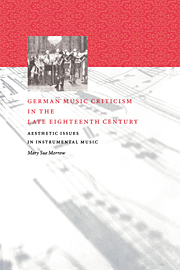Book contents
- Frontmatter
- Contents
- Acknowledgments
- Author's note
- Introduction: terms of discourse
- 1 What does instrumental music mean?
- 2 Answering with a unified voice
- 3 Answering with a German voice
- 4 Answering with aesthetic criteria
- 5 The importance of being correct
- 6 The reign of genius
- 7 A call to order
- 8 Epilogue: segue to the nineteenth century
- Notes
- Bibliography
- Index
Introduction: terms of discourse
Published online by Cambridge University Press: 03 October 2009
- Frontmatter
- Contents
- Acknowledgments
- Author's note
- Introduction: terms of discourse
- 1 What does instrumental music mean?
- 2 Answering with a unified voice
- 3 Answering with a German voice
- 4 Answering with aesthetic criteria
- 5 The importance of being correct
- 6 The reign of genius
- 7 A call to order
- 8 Epilogue: segue to the nineteenth century
- Notes
- Bibliography
- Index
Summary
This book addresses the fundamental change in the German perception of instrumental music that occurred around 1800, when the clear aesthetic preference for vocal music, especially opera, that pervaded the world of the German Enlightenment gave way to an exalted view of the powers of purely instrumental composition. For writers and critics like E. T. A. Hoffmann, writing in the early decades of the new century, instrumental music represented the pinnacle of aesthetic expression. The change was stunning, and the musical aesthetic that emerged, reinforced by the works of composers like Beethoven, continues to shape our attitude toward music today, nearly two centuries later.
This aesthetic shift occurred simultaneously with a change in the position of instrumental music in the larger cultural context. During the eighteenth century, instrumental music played a mostly functional role in German and Austrian society. Symphonies served to open concerts and operas, quieting down audiences and providing background music during intermissions. Concertos gave virtuosos a vehicle for displaying their talents, and also frequently turned up as intermission fillers in theaters. Keyboard sonatas (both solo and accompanied), duos, trios, string quartets - all were intended for home consumption, meant to provide musical entertainment for growing numbers of dilettante musicians in the aristocracy and wealthy bourgeoisie. If a piece fulfilled the expectations for its genre and role, it could be judged as successful, then both audience and performer would move onto something new.
- Type
- Chapter
- Information
- German Music Criticism in the Late Eighteenth CenturyAesthetic Issues in Instrumental Music, pp. 1 - 3Publisher: Cambridge University PressPrint publication year: 1997



